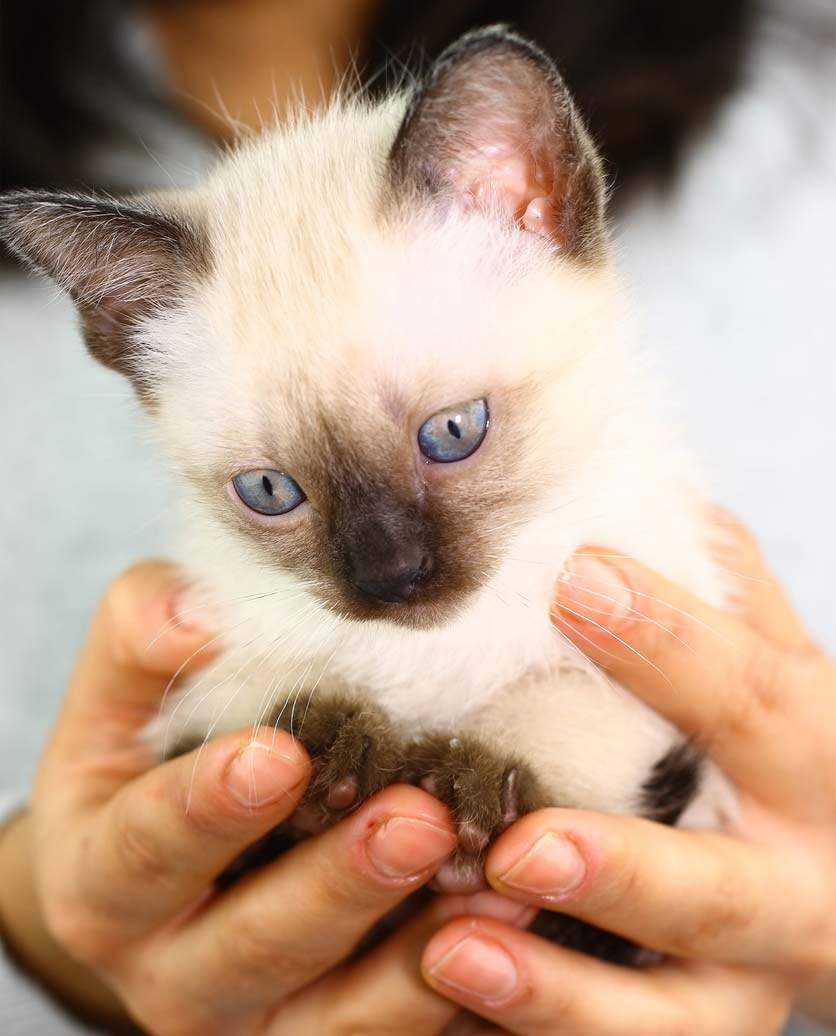Adopting a New Kitten or Cat

Congratulations! You're about to adopt a new kitten or cat and enter a fabulous and fulfilling feline friendship. Besides lots of love and play, though, there are many things to consider as you're deciding how to add this little furry friend to your family.
Breed: Do you want a sweet, mixed-breed domestic short- or long-haired kitten from the shelter? Or do you prefer a purebred kitten with a pedigree? Cats vary in physical appearance and personality type; this can be breed-dependent. It's a good idea to make decisions prior to your search, as you may choose to examine shelters, contact cat breeders, or evaluate breed-specific rescue groups. Please keep in mind, though, that there are lots of cats and kittens that desperately need homes. Even if you are looking for a specific breed of cat, you might want to consider contacting breed rescues.
Age: Does the idea of a tiny, adorable, helpless, mewling fluff-ball kitten appeal to you? Or do you want a more robust, older, and self-sufficient kitty? Perhaps you don't want to deal with a juvenile at all and prefer an adult cat? Kittens are incredibly active, full of energy, and require training and lots of attention. In general, most kittens should be fully- weaned from their mothers and eating solid food prior to starting off in a new home. Early removal from moms may result in health or behavior problems; some experts speculate that kittens that are taken from their mothers too early may nurse inanimate objects and even their owners. You can read more about wool-sucking and chewing behavior in our article: "Pica in Cats: Why Cats Eat Strange Things."
Indoor or Outdoor: Whether your cat will stay strictly inside or be allowed to venture outside is a tough decision and one you'll need to make once your cat reaches adult age. In general, indoor cats live safer, longer lives and are not as susceptible to cat fights, cars, encounters with wild animals, parasites, infectious diseases, and other risks unique to outdoor exposure. Conversely, outdoor cats may not be as prone to obesity or behavior issues. If you are grappling with these decisions, the best course is to speak openly with your veterinarian about the optimal choices for your household. You can also learn more in the article "How to Decide on an Indoor or Outdoor Lifestyle for Your Cat."
House Size: Do you have a big house or a tiny studio apartment? No matter where you reside, please make sure to give your kitty a safe and private escape spot. Also, make sure that you have adequate room for storing toys, food, and litter boxes. Litter boxes can become particularly odiferous, and you'll typically need more than one for your kitten. You can learn more about good litter box placement in this "helpful tips" article. Also determine whether certain rooms in the house will be off limits to the kitten. Kitten-proof your home by keeping medications and cleaners locked up and appliances closed off. Restrict your kitten's access to yarn, string, paper clips, staples, and hair bands—all are commonly-identified foreign bodies. Swallowing them can be injurious or even fatal. Learn more about why strings are dangerous for cats in the article "<The Dangers of Strings, Ribbons, and Yarn for Cats."
Declawing: Please Don't. Declawing involves ten separate amputations of the last joint in each of your cat's claws. There are very effective alternatives to declawing, such as scratching posts and Soft Paws nail caps. You can learn more about why some communities are seeking to ban declaw surgeries here.
Spaying/Neutering: Spaying or neutering is usually recommended for all cats. Sterilizing cats not only helps deal with the over-population problem, but it also aids in preventing behavioral problems and certain health issues. Please discuss this with your veterinarian.
Other Cats and Dogs: It is important to introduce any other dogs or cats to your kitten under slow and controlled circumstances. It is equally imperative to have a safe and private retreat spot for the kitten to escape. Pets gradually acclimate to one another. Feliway can be helpful because it mimics the "feel-good" pheromone cats deposit when they rub their cheek on an object. Please talk to your veterinarian if you're having difficulties with introducing new pets to each other. You can read an article with tips on introducing new cats to one another here: "How to Introduce a New Cat to a Household that Already Has a Cat."
Children: Do you have babies or children? Teach the children to interact with the kitten gently and with respect. NEVER allow young children or babies to be unsupervised with the kitten.
Playtime: Make sure that you keep a plenty of enrichment toys available for your kitten to enjoy. In addition, please ensure that your kitten has plenty of regular contact with human household members both for play and for appropriate socialization. Interactive play sessions with a wand toy are a great way to help exercise and socialize your kitty.
Food: Are you going to feed your new cat dry kibble or canned food? Both have benefits: dry food is easier to store and handle and can be left out for long periods of time. Canned food is considered more palatable and may have a dietary make-up more suited to feline nutritional needs than dry food.
Necessary Supplies: You will need the following supplies, at a minimum, for your new cat:
- Travel carrier
- Food and water dishes
- Cat food
- Litter boxes
- Litter
- Toys
- Cat beds
- Mess cleaner
- Scratching posts
It's a good idea to invest in some books about basic kitten training and management.
Veterinarian: Identify your veterinarian as soon as you can prior to adopting your cat or kitten. Your veterinarian will be your most important resource for your kitten's health and husbandry. A thorough physical exam after getting your kitty will help ensure that he or she receives the proper vaccinations, deworming, and health advice to live a long happy life.
Pet Insurance: Consider whether pet insurance is right for you. Purchasing insurance before your new cat has problems can help you the most with any unforeseen health bills. You can learn more about cat insurance in our article "Pet Insurance: Peace of Mind for Your Cat's Health."
Prepare for the Costs: Cat-ownership does come with some costs, and it's best to know what those are and plan for them before you bring home your new addition. Consult this article: "How to Be Prepared for Your Cat's Veterinary Bills" to learn more about the main costs that you should expect when acquiring a new cat.
Congratulations on your new family member! Rely on your veterinarian to take you through the joys of cat companionship. Your vet is your best resource to help ensure the health of your feline friend.
You May Also Like These Articles:
Devon Rex Cats: An Interview with Fancy Cat
Persian Cats: An Interview with Fancy Cat
Top 10 Most Popular Cat Breeds
Siamese Cats: An Interview with Fancy Cat




